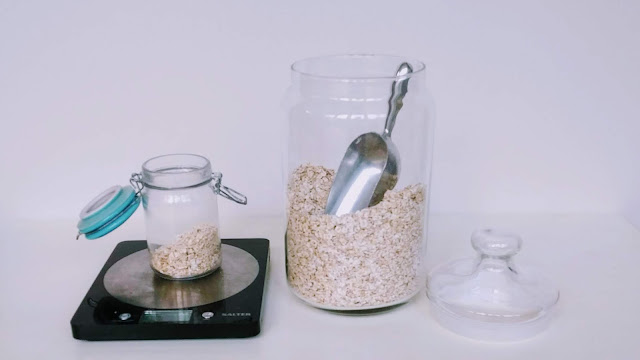A Month of Living without Plastic - What the weekly shop looks like
I think our weekly shop
looks pretty similar to our shop pre-2019. There is just one main thing missing and that is all the completely
unnecessary single use plastic. On most
things I have managed to find a work around. The first month going plastic free was a real
eye opener. Plastic is everywhere and on
everything. I think we did pretty well
though, and going cold turkey on plastic really challenged me and the household’s
creativity with food and how we live our lives. A side effect I did not anticipate is it has
made me far more conscious of waste, this is purely due to the fact that there
is hardly any rubbish in our landfill bin so when I do go to put something in
the bin it is more obvious.
Slowly as I use up things in the house: shampoo, shower gel, cleaning products, loo roll I am looking into alternatives but I am not panic buying greener alternatives at the expense of the plastic we already have in the house just going in the bin or going to waste. Generating waste for the sake of it is not the aim of the game. I find the plastic I do have I think twice before I recycle it, can I use this for something else, should I hold on to it and refill it at a later date? I am beginning to value the plastic I have in the house. After all, once I have finished what is in it, I will not be buying any more.
What does going plastic
free cost? Thankfully not more in money terms; It costs more time:
- Initially the time has been in understanding what the packaging
is made of on everyday items and knowing what I can buy and what to avoid,
finding the new places to shop.
- Time organising all my bags, product bags, jars and Tupperware before leaving the house to go shopping.
- Time in going around different shops and stalls to get all
the things I need for the week.
Although I am finding traditional market halls, Altrincham,
Knutsford are ideal for getting my weekly shops. Or large supermarkets
with a meat and cheese counter.
- Time to plan the weekly shop and meals which ultimately lead to less waste.
- Time to cook meals and snacks from scratch.
What we had to give up because we couldn’t find a work around:
Butter only a few years ago the ‘cheap’/’value’ butters used to be in paper
packaging, then they all moved towards this mixed material wrap. As it is mixed plastic material it cannot be
recycled so it has to end up in landfill.
Since the end of January we have started buying butter again. I weighed this up in my head instead of the
recyclable containers of margarine or spreadable. If less than £25% of recyclable plastics are actually
recycled, the amount of waste material in a wrap for butter is considerably less
than the 75% of the plastic tub that will not be recycled. I buy the largest block of butter I can find to
reduce the ratio of butter to packaging.
Yogurt is in plastic containers.
We have since started buying this but I am looking into making my own to
save needing to buy so much. I am only
buying containers that can be completely recycled.
The main things I have
learnt after the first month with no plastic is it is not always convenient and
it can be more time consuming as you fill your own bags and containers rather
than grabbing the convenient bags or packs of items. And it is certainly
not always cheaper for individual items. But I think being mindful about
plastic has made me more aware of waste and in particular food waste, and the planning of the weekly shop. Reducing the meat I am eating
has meant our plastic free weekly shop is not costing any more than
it did last year.
Going plastic free and becoming more conscious of waste has not cost more, in fact doing both has made me more aware and thoughtful about what I do buy, ultimately saving money. This is especially true if you don't rush out and buy lots of new green stuff (metal straws, bees wax wraps, metal water bottles, bamboo cutlery)! For me its about finding new habits for my shopping, a new isle to walk down and new areas in which to shop.
Going plastic free and becoming more conscious of waste has not cost more, in fact doing both has made me more aware and thoughtful about what I do buy, ultimately saving money. This is especially true if you don't rush out and buy lots of new green stuff (metal straws, bees wax wraps, metal water bottles, bamboo cutlery)! For me its about finding new habits for my shopping, a new isle to walk down and new areas in which to shop.



Comments
Post a Comment